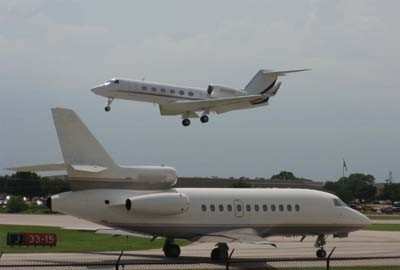Does Proposed Bailout Ban ALL Uses Of Corporate
Aircraft?
 On Wednesday, National Business
Aviation Association President and CEO Ed Bolen expressed his
concern that language regarding the use of business aviation, as
included in a proposed auto industry financial assistance package
being considered by the US House of Representatives, could have
unintended consequences.
On Wednesday, National Business
Aviation Association President and CEO Ed Bolen expressed his
concern that language regarding the use of business aviation, as
included in a proposed auto industry financial assistance package
being considered by the US House of Representatives, could have
unintended consequences.
This is the statement, from
Section 12(b)(4) of the bailout bill:
"During the period in which any financial assistance provided
under this Act to any eligible automobile manufacturer is
outstanding, the eligible automobile manufacturer may not own or
lease any private passenger aircraft, or have any interest in such
aircraft, except that such eligible automobile manufacturer shall
not be treated as being in violation of this provision with respect
to any aircraft or interest in any aircraft that was owned or held
by the manufacturer immediately before receiving such assistance,
as long as the recipient demonstrates to the satisfaction of the
President’s designee that all reasonable steps are being
taken to sell or divest such aircraft or interest."
In a letter to House Speaker Nancy Pelosi, Bolen (right) points
out that the language in the bill regarding business aviation
"appears to prohibit the use of business aviation in ALL
situations, including when it is the sole mode of transportation
available to a business, or it is the most prudent and
cost-effective solution to a given transportation challenge."
Bolen's letter continues: "While we understand the intent of
Congress to address a specific situation dealing with the auto
industry, we believe that the broad wording of the provision could
be misinterpreted as suggesting that Congress does not recognize
the critical importance of this mode of transportation to the
success of US businesses facing unprecedented international
competition, the economic development of small towns and rural
communities, and the jobs of hundreds of thousands
of US workers."
Bolen's organization is particularly sensitive to the issue, as
business aviation has become a whipping boy on Capitol Hill during
contentious hearings over whether the federal government should
provide billions in taxpayer funds to rescue the near-defunct
automakers. Lawmakers derided the CEOs of Ford, GM and Chrysler for
flying to Washington last month, hats in hand, each onboard their
own corporate jets... which all departed at roughly the same time
from Detroit Metro.
As ANN reported, Ford and GM have since
drastically slashed their own corporate flight operations, in
an effort to pander for support from Congress... which
apparently worked, despite the fact many lawmakers also use bizav
for their transportation needs.

Bolen's letter "reminds" Speaker Pelosi of many reasons that
businesses and communities rely on business aviation... including
the lack of availability of scheduled airline service when
needed.
"With about 100 US cities having lost airline service in the
past year, it's easy to understand why so many smaller towns have
found business aviation to be a critical lifeline for their
economic development. Nobody wants to see a company be forced to
move simply because its community has lost its commercial airline
service," the letter states.
Bolen's letter also points out that the business aviation
community is comprised of a diverse composite of hundreds of
thousands of people. "These workers include schedulers,
dispatchers, maintenance technicians, pilots, training
professionals, insurers, and many other disciplines." Bolen further
notes, "Congress should recognize that these are good jobs,
performed by good people. The work they do matters to the companies
they work for, the communities they live in, and our nation as a
whole."

Bolen concludes his letter by pointing out that the Association
understands the importance of strong federal stewardship of any
federal monies provided to the US auto companies. "However," the
letter asserts, "We urge you to craft this legislation in a manner
which does not inadvertently harm another critical US industry. We
want to be careful not to hurt the ability of American companies to
do the things that allow them to keep people working and to
compete."
 NTSB Final Report: Cessna 177B
NTSB Final Report: Cessna 177B ANN's Daily Aero-Term (05.08.25): Final Approach Fix
ANN's Daily Aero-Term (05.08.25): Final Approach Fix Aero-News: Quote of the Day (05.08.25)
Aero-News: Quote of the Day (05.08.25) ANN's Daily Aero-Term (05.09.25): Estimated (EST)
ANN's Daily Aero-Term (05.09.25): Estimated (EST) ANN's Daily Aero-Linx (05.09.25)
ANN's Daily Aero-Linx (05.09.25)





